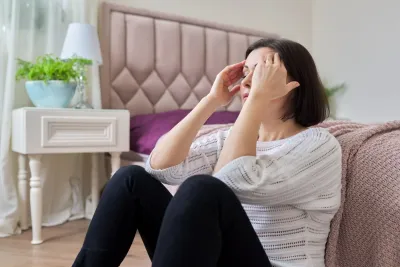Understanding Menopause Dizziness: Causes and Effective Treatments
Sleepme Editorial Team • Jun 09, 2025

Key Takeaways
- Hormonal Fluctuations: Shifting estrogen levels during menopause can disrupt the vestibular system, causing unexpected dizziness or balance issues.
- Common Triggers: Dehydration, hot flashes, anxiety, and poor sleep can all make dizziness worse.
- Lifestyle Fixes: Staying hydrated, cooling down, and managing stress can go a long way in reducing dizzy spells.
- Sleep Connection: Poor sleep can amplify dizziness—making a cool, optimized sleep environment more important than ever.
- When to Act: If dizziness persists or worsens, it’s time to consult a healthcare provider to rule out other underlying causes.
Menopause introduces various physiological changes, among which dizziness is a frequently reported symptom. Grasping the influence of menopausal status on dizziness is crucial for identifying effective treatments.
By uncovering its causes and exploring potential solutions, women can significantly enhance their quality of life during this menopausal transition.
What is Menopausal Dizziness?
Menopausal dizziness is a common symptom experienced by many women during menopause. It is characterized by feelings of lightheadedness, faintness, unsteadiness, and nausea. This type of dizziness is often linked to hormonal fluctuations, particularly the decline in estrogen levels, which can affect the autonomic nervous system and lead to these unsettling sensations.
Additionally, menopausal dizziness can be exacerbated by other factors such as anxiety, heart palpitations, and migraines, making it a multifaceted issue that requires a comprehensive understanding and approach.
For example, you’re standing in the kitchen, making your morning coffee, when suddenly the room feels like it’s doing a slow spin. No, it’s not the caffeine—it’s likely menopause-related dizziness. As estrogen levels dip, it can throw off your inner ear and circulation, making balance feel a bit wonky. It’s surprisingly common, and while it’s unsettling, it’s usually temporary and manageable.
Causes of Dizziness During Menopause
Many women experience dizziness during menopause, and this discomfort can arise from a combination of factors, such as:
Hormonal Fluctuations
During menopause, the significant decline and fluctuation of estrogen levels can disrupt the body's delicate balance system. Think of estrogen as a vital regulator, and its diminishing presence affects two key areas: the inner ear and blood vessels. The inner ear, responsible for sensing movement and maintaining equilibrium, relies on stable estrogen levels to function correctly.
When estrogen drops, the fluid and signals within the inner ear can become erratic, leading to sensations of unsteadiness or vertigo, where the world feels like it's spinning. Simultaneously, estrogen plays a crucial role in maintaining blood vessel flexibility and responsiveness.
As levels decrease, blood vessels may struggle to regulate blood flow, resulting in sudden drops in blood pressure, particularly when standing up, which can cause lightheadedness and dizziness.
Blood Sugar and Blood Pressure Variations
During menopause, the decline of estrogen levels can have a ripple effect on blood sugar and blood pressure, contributing to feelings of dizziness. Estrogen plays a role in insulin sensitivity, which is how effectively your body uses insulin to regulate blood sugar. As estrogen levels decrease, insulin sensitivity can be affected, leading to fluctuations in blood sugar levels.
These sudden shifts, whether spikes or drops, can trigger lightheadedness or dizziness. Additionally, estrogen helps maintain the flexibility and responsiveness of blood vessels, which are crucial for regulating blood pressure. With the reduction of estrogen, blood vessels may become less adaptable to positional or activity changes, potentially leading to abrupt declines in blood pressure, particularly when standing up.
This drop, known as orthostatic hypotension, can cause a temporary lack of blood flow to the brain, leading to dizziness or lightheadedness. Therefore, the hormonal changes of menopause can indirectly contribute to dizziness by disrupting the body's ability to maintain stable blood sugar and blood pressure levels.
Tip: By consuming regular, well-balanced meals and snacks, you can minimize blood sugar fluctuations, which can trigger dizziness. Explore some of Emma's recipes to help you embrace change.
Sleep Disturbances
Sleep disturbances, particularly those caused by symptoms such as menopausal night sweats or hot flashes, significantly impact the body's ability to regulate its systems. The constant awakenings and poor sleep quality lead to a build-up of sleep deprivation, which can manifest as fatigue and dizziness.
When you sleep hot, you're deprived of adequate sleep, your brain and nervous system are less efficient at processing information and maintaining balance, making you more prone to feeling lightheaded or unsteady.
Menopause Symptoms Stealing Your Sleep?
The Chilipad is here! Designed to help women going through menopause get the restful, uninterrupted sleep they deserve, it lets you take control of your bed temperature—no more tossing, turning, or sweating through the night. Reclaim your nights and wake up refreshed. Try Chilipad and feel the difference tonight.
Other Factors Contributing to Menopause Dizziness
If you're experiencing dizziness during menopause, it's helpful to know that it can stem from more than just hormonal shifts.
Here are some other potential causes:
- Anxiety: Anxiety is a common menopause symptom that can significantly contribute to dizziness. Studies have shown that women experiencing anxiety are more likely to report dizzy spells. [1]
- Heart Palpitations: Affecting up to 47% of peri- and postmenopausal women, heart palpitations can also lead to feelings of dizziness and unsteadiness.
- Migraines: Migraines, which impact up to 29% of women during menopause, are another potential cause of dizziness. [2]
- Benign Paroxysmal Positional Vertigo (BPPV): This inner ear disorder can cause vertigo symptoms, with perimenopausal women being particularly prone to developing BPPV. [3]
- Meniere’s Disease: This condition, which involves an abnormal buildup of fluid in the inner ear, can also trigger vertigo and dizziness.

Managing Menopausal Dizziness
Dizziness during menopause can throw you off balance—literally. But the good news? There are smart, practical ways to manage your symptoms and keep that lightheaded feeling in check. Here’s what can help:
- Staying Hydrated: Drinking plenty of water helps prevent dehydration, a common cause of dizziness.
- Eating Small, Healthy Meals: Keeping blood sugar levels stable by eating regular, balanced meals can reduce dizzy spells.
- Avoiding Caffeine and Alcohol: Both caffeine and alcohol can exacerbate dizziness and should be consumed in moderation or avoided.
- Exercising Regularly: Physical activity improves cardiovascular health and balance, which can help mitigate dizziness.
- Practicing Relaxation Techniques: Techniques such as deep breathing or meditation can reduce anxiety, a known contributor to feeling dizzy.
- Considering Hormone Replacement Therapy (HRT): HRT can help alleviate hormonal fluctuations and reduce dizziness symptoms. However, it’s important to consult with a healthcare provider to discuss the benefits and risks.
- Improve Sleep Quality: Sleeping cooler, especially with a Chilipad cooling mattress topper, can significantly alleviate common menopause symptoms by regulating body temperature.
Medical Treatments
For persistent dizziness, medical interventions may be necessary. During the menopause transition, medical interventions may be necessary to manage severe dizziness.
- Hormone Replacement Therapy: Hormone therapy can stabilize hormonal fluctuations, potentially alleviating dizziness. It's important to consult with a healthcare provider to carefully weigh the benefits and potential risks.
- Alternative Supplements: Some find relief using supplements like black cohosh or ginseng, though their efficacy varies. Always speak with your healthcare provider before starting any supplement regimen.
When to Seek Medical Attention
If you’re experiencing severe or persistent menopause symptoms, including dizziness or other symptoms, it’s important to speak to your doctor. Dizziness can sometimes be linked to underlying heart conditions or other medical concerns. If you experience any of the following common symptoms, seek medical attention immediately:
- Chest pain or shortness of breath
- Severe headache or confusion
- Sudden loss of balance or coordination
- Numbness or weakness in the face, arm, or leg
- Difficulty speaking or swallowing
These menopausal symptoms could indicate a more serious condition that requires prompt medical evaluation and treatment.
You Can Decrease Dizziness Symptoms
Menopausal dizziness arises from a combination of hormonal shifts, blood sugar and pressure changes, sleep disruptions, anxiety, and inner ear issues. Managing it involves lifestyle changes like balanced meals, hydration, and exercise.
For persistent dizzy spells, it's best to consult your doctor about medical options. Seek immediate medical help for severe symptoms like chest pain or sudden loss of balance. Understanding these causes and treatments empowers women to improve their well-being during menopause.
Frequently asked questions
Why Do I Feel Dizzy During Menopause?
Dizziness during menopause can be caused by:
- Hormonal Fluctuations: Changes in estrogen levels can impact blood pressure, circulation, and the inner ear, leading to dizziness.
- Dehydration: Not drinking enough water can lower blood volume and cause lightheadedness.
- Anxiety and Stress: Hormonal shifts can increase anxiety, which may trigger dizziness.
- Blood Sugar Imbalances: Fluctuations in blood sugar levels can contribute to feeling lightheaded or dizzy.
Can Menopause-Related Dizziness Affect Sleep?
Yes, and it's a double whammy. Dizziness can make it tough to fall asleep or stay asleep, while poor sleep can make dizziness worse. It’s a frustrating cycle, but treatable.
How Do I Know If My Dizziness Is Due to Menopause?
If you're in perimenopause or menopause and notice dizziness alongside other common symptoms like hot flashes, night sweats, or mood swings, it could be hormone-related. Always rule out other causes with your doctor.
What Are Effective Ways to Manage Menopause-Related Dizziness?
- Stay hydrated and avoid caffeine and alcohol
- Eat regular, balanced meals
- Manage stress with mindfulness or yoga
- Keep your sleep environment cool and consistent
- Talk to your doctor about hormone therapy or other treatments









